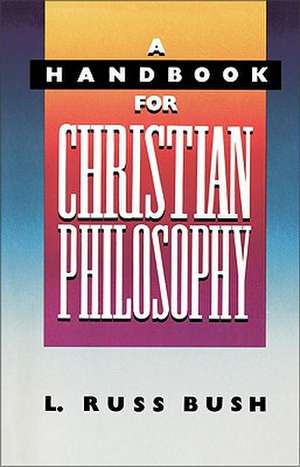A Handbook for Christian Philosophy
Autor L. Russ Bush IIIen Limba Engleză Paperback – 8 iul 1991
Preț: 171.34 lei
Nou
Puncte Express: 257
Preț estimativ în valută:
32.79€ • 35.60$ • 27.54£
32.79€ • 35.60$ • 27.54£
Carte tipărită la comandă
Livrare economică 23 aprilie-07 mai
Preluare comenzi: 021 569.72.76
Specificații
ISBN-13: 9780310518211
ISBN-10: 0310518210
Pagini: 340
Dimensiuni: 139 x 216 x 25 mm
Greutate: 0.44 kg
Editura: Zondervan Academic
Colecția Zondervan Academic
Locul publicării:Grand Rapids, United States
ISBN-10: 0310518210
Pagini: 340
Dimensiuni: 139 x 216 x 25 mm
Greutate: 0.44 kg
Editura: Zondervan Academic
Colecția Zondervan Academic
Locul publicării:Grand Rapids, United States
Descriere
This
handbook
acquaints
readers
with
philosophy
in
an
introductory
and
nontechnical
way.
These
materials,
first
developed
for
use
in
classes
as
a
supplement
to
other
formal
textbooks,
are
designed
to
gain
the
confidence
of
students
who
have
no
technical
level
of
expertise
in
the
field
of
philosophy.
There
is
a
very
useful
glossary
at
the
end
that
will
be
of
help
to
all
readers,
listing
more
than
just
simple
definitions.
Often
the
glossary
explanations
are
like
brief
essays
in
themselves.
Many
significant
issues
arise
in
the
field,
but
this
book
treats
three
in
particular:
theistic
proofs,
evil,
and
creation.
A
Handbook
for
Christian
Philosophy
offers
several
contributions
that
make
it
unique.
First,
there
is
a
section
on
logic
that
relates
the
subject
of
logic
to
biblical
exegesis.
Second,
the
treatment
of
evil
puts
special
emphasis
on
the
biblical
themes
that
provide
practical
and
theoretical
help
for
people
who
are
experiencing
evil
and
going
through
suffering.
Third,
the
chapter
on
creation
includes
an
up-to-date
critique
of
naturalistic
evolution
and
a
review
of
the
recurrent
Christian
principles
on
this
topic.
The
author
provides
an
excellent
worldview
evaluation,
something
that
is
desperately
needed
today
by
all
Christians.
The
chapters
include:
What
is
philosophy?;
How
to
study
philosophy;
Learning
to
think
logically;
Recognizing
worldviews;
Testing
worldviews;
The
existence
of
God;
Creation,
the
reasonable
alternative;
and
a
final
chapter
on
God
and
evil.
